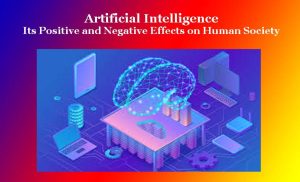Explore the transformative impact of Artificial Intelligence (AI) on human society, from its positive effects on healthcare, productivity, and safety to the potential challenges related to job displacement, privacy concerns, and ethical dilemmas. Discover how AI is reshaping industries and sparking critical conversations about ethics, accountability, and the future of work in this comprehensive article.
Artificial Intelligence-Its Positive and Negative Effects on Human Society
Artificial Intelligence, also known as AI, has been a topic of interest and research for many decades. The history of AI can be traced back to the mid-20th century when computer scientist John McCarthy first introduced the term “Artificial Intelligence” at a conference in 1955. This marked the beginning of a new field of study aimed at creating machines that could perform tasks that typically required human intelligence, such as reasoning, learning, and perception.
The early years of Artificial Intelligence research focused on developing algorithms that could perform simple mathematical calculations, but over time, the goals of the field evolved to include more complex tasks such as natural language processing, image recognition, and even playing chess. In the 1960s, the first AI language called LISP was developed, which became a foundation for many AI applications that followed.
In the late 1970s and early 1980s, AI saw a resurgence of interest and funding, and many of the major players in the field today were formed, including companies such as IBM and Microsoft. During this time, AI technologies such as expert systems and decision trees were developed, which were used in a variety of applications such as medicine, finance, and law.
However, in the late 1980s and early 1990s, Artificial Intelligence faced a period of reduced funding and decreased public interest known as the “AI Winter.” This was due in part to the realization that many of the initial promises of AI had not yet been fulfilled, and also to the growing competition from other emerging technologies such as the internet.
In recent years, AI has experienced a rebirth of interest and investment, driven by advances in areas such as machine learning, deep learning, and natural language processing. These advances have made it possible for machines to perform tasks that were previously thought to be only within the realm of human capability. For example, AI has been used in applications such as speech recognition, self-driving cars, and even in the diagnosis of diseases.
The future of Artificial Intelligence is both exciting and uncertain. While AI has the potential to revolutionize many aspects of our lives, there are also concerns about the impact it may have on jobs and society as a whole. Some experts believe that AI has the potential to create new jobs and industries, while others fear that it may lead to widespread unemployment.
The Positive Effects of AI on Human Society
The Positive Effects of Artificial Intelligence on Human Society are many which may be summarised below:
Increased Efficiency: AI automates repetitive and mundane tasks, freeing up time and resources for more creative and strategic work.
Improved Healthcare: AI-powered technologies such as machine learning algorithms and big data analytics help medical professionals diagnose diseases more accurately and provide personalized treatments.
Enhanced Customer Experience: AI-powered chatbots and virtual assistants provide quick and convenient customer support 24/7.
Advancements in Science and Technology: AI has led to new discoveries and innovations in fields such as chemistry, physics, and materials science.
Better Decision Making: AI can analyze vast amounts of data and provide insights that would not be possible for humans to detect, leading to more informed decision-making.
Increased Accessibility: AI-powered technologies such as speech recognition and language translation make it easier for people with disabilities to use technology.
Improved Safety: AI is used in various applications such as autonomous vehicles, security systems, and disaster response to improve safety and reduce risks to human life.
The Evil Effects of AI on Human Society
Artificial Intelligence (AI) has the potential to greatly benefit humanity, but it also poses significant risks and challenges. Some of the potential negative effects of AI on human civilization include:
Job Displacement: AI and automation are rapidly replacing human workers in many industries, leading to widespread job loss and unemployment. This could have a devastating impact on the global economy, exacerbating income inequality and creating social unrest.
Bias and Discrimination: AI systems can perpetuate and amplify existing biases and discrimination, leading to unequal outcomes for different groups of people. For example, facial recognition technology has been shown to have higher error rates for people with darker skin tones.
Privacy Violations: AI systems can collect and analyze massive amounts of personal data, creating privacy risks and violating individual rights. This data can also be used to manipulate or control populations, as seen with the widespread use of social media algorithms to influence elections.
Weaponization: AI is being developed and used for military purposes, potentially leading to an armed race and increasing the risk of conflict and violence. Autonomous weapons systems raise serious ethical concerns about accountability and the potential for unintended harm.
Dependence on Technology: As AI becomes more deeply integrated into our lives, there is a risk that we will become overly dependent on technology, losing our autonomy and ability to make independent decisions.
Overall, it is clear that the potential negative effects of AI on human civilization are significant and cannot be ignored. It is crucial that we develop responsible policies and regulations to ensure that the development and deployment of AI benefits society as a whole and do not lead to harm. 0 0 0.
FAQs About Artificial Intelligence-Its Positive and Negative Effects on Human Society
FAQs about Artificial Intelligence:
1. How is Artificial Intelligence (AI) shaping human society?
AI is revolutionizing various industries and sectors by automating processes, enhancing efficiency, and enabling advancements in technology. From healthcare and finance to transportation and education, AI is significantly impacting how we live and work.
2. What are some positive effects of AI on human society?
- Improved healthcare: AI is contributing to medical breakthroughs, personalized treatments, and diagnostics, leading to better patient outcomes.
- Enhanced productivity: AI-driven automation streamlines tasks, boosts productivity, and frees up human workers for more creative and strategic roles.
- Increased safety: AI is utilized in areas like autonomous vehicles, surveillance systems, and disaster response to improve safety and minimize risks.
- Personalized experiences: AI algorithms provide tailored recommendations, customized services, and personalized experiences for users in various applications.
3. What are the potential negative effects of AI on human society?
- Job displacement: Automation and AI technologies may lead to the loss of certain jobs and skills, potentially widening the economic gap and creating unemployment challenges.
- Privacy concerns: AI systems collect and analyze vast amounts of data, raising concerns about privacy, data security, surveillance, and potential misuse of personal information.
- Bias and discrimination: AI algorithms may inherit biases from their training data, leading to discriminatory outcomes in areas such as hiring, lending, and law enforcement.
- Ethical dilemmas: AI raises complex ethical questions regarding responsibility, accountability, transparency, and the impact of autonomous decision-making on society.
4. How can we address the negative impacts of AI on human society?
- Ethical AI development: Establishing guidelines, regulations, and ethical frameworks for AI development and deployment to ensure responsible use and mitigate potential harms.
- Transparency and accountability: Promoting transparency in AI systems, ensuring clear decision-making processes, and holding developers accountable for the outcomes of AI applications.
- Diversity in AI development: Encouraging diversity and inclusivity in AI teams to address bias and discrimination issues in algorithm design and implementation.
- Lifelong learning and reskilling: Investing in education, training, and reskilling programs to prepare the workforce for the changing demands of an AI-driven society.
These FAQs aim to provide insights into the positive and negative effects of Artificial Intelligence on human society, highlighting the complexities and challenges associated with the rapid
N.B. The article ‘Artificial Intelligence- Its Positive and Negative Effects on Human Society’ originally belongs to the book ‘Essays on Science And Technology‘ by Menonim Menonimus.
Books of Composition by M. Menonimus:
- Advertisement Writing
- Amplification Writing
- Note Making
- Paragraph Writing
- Notice Writing
- Passage Comprehension
- The Art of Poster Writing
- The Art of Letter Writing
- Report Writing
- Story Writing
- Substance Writing
- School Essays Part-I
- School Essays Part-II
- School English Grammar Part-I
- School English Grammar Part-II..
Related Search:










